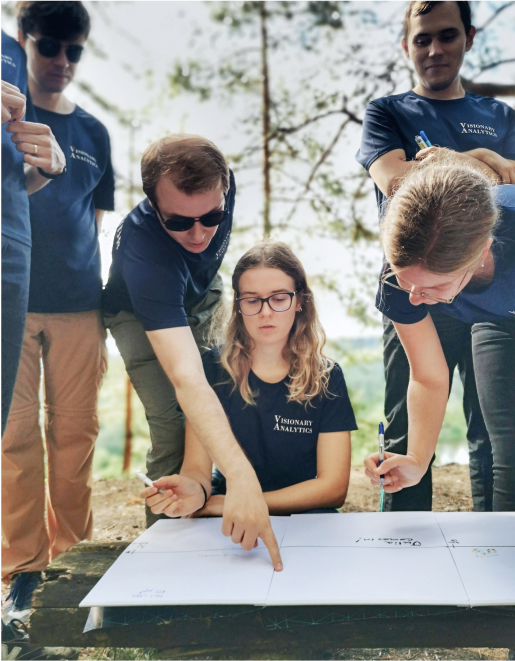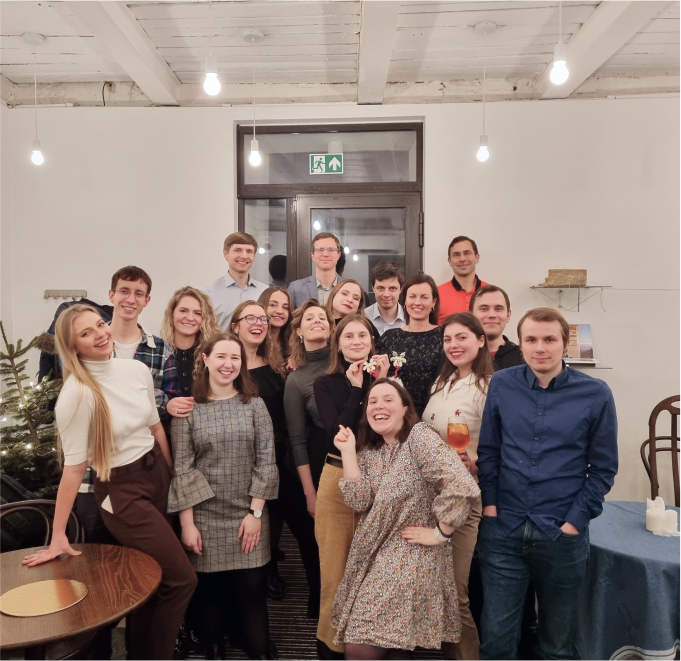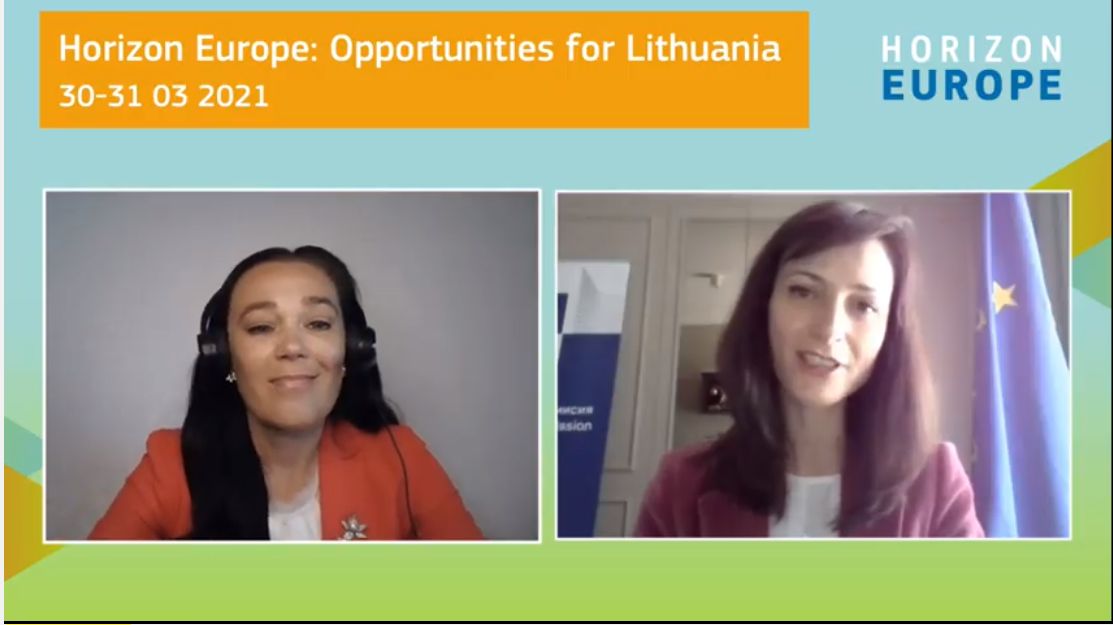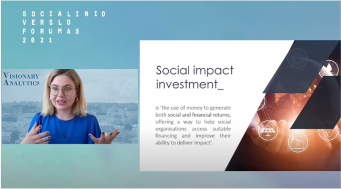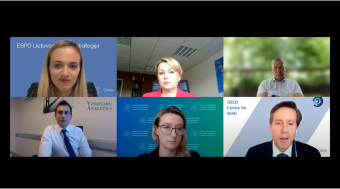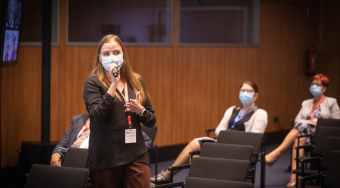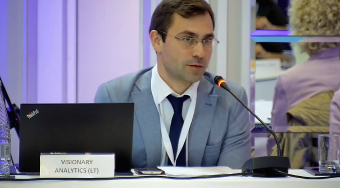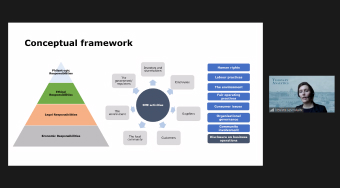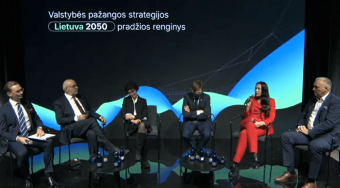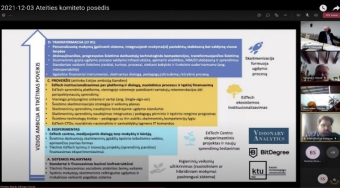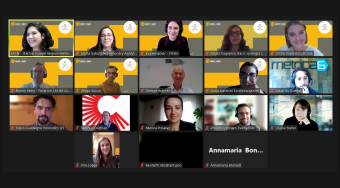In 2021 Visionary Analytics adapted to new challenges and continued working on a wide range of research areas. Take a look at the overview of our 2021 achievements, highlights, and contributions to the wider societal impact.
2021 highlights

Company growth - extending our expertise beyond education and innovation
Originally established as an institute specialising in innovation and education policy areas, over the years Visionary Analytics has expanded its areas of expertise to other critical policy domains such as digitalisation, labour market and social policies, green transition, and future-fit policies. We are driven by the ambition to make a profound and lasting impact on public policy (producing knowledge for impact).
In 2021 our stream of work in the areas of digital transition and its social impact especially intensified. The last decade saw an exponential spread of digital technologies and their applications across multiple domains, facilitated also by the COVID-19 pandemic. However, digitalisation comes with increasingly novel, complex, and profound issues that extend from employee well-being to the digital divides, which may negatively impact societies across the EU. We were happy to contribute to relevant policy debate on evidence-based models for the digital transformation of educational system and teachers’ professional development (Transform_ED project), the European research (open) data landscape (project for DG Research and Innovation), the open platform economy (project supporting the EU Observatory on the Online Platform Economy for DG CNCT), and many other significant topics. You may see a list of our most recent projects below.
This intense and interesting year contributed to company growth – the turnover of Visionary Analytics doubled in 2021 compared to 2020.

Sharing our knowledge and giving back to the society
We have a responsibility to use our knowledge and capabilities to help build a better and more sustainable World as well as address the most pressing challenges within our specialisation areas. As a private research institute, we allocate internal resources to pursuing our R&D activities. We seek to share our results with the society, therefore contributing to the global knowledge base, bridging science and society, and last but not least – helping build a successful image of Lithuania as a science and innovation country.
Last year our articles were published by Work, Employment and Society and Triple Helix, among others. We initiated and contributed to some new internal research projects, including open participatory governance and gender equality in academia (the latter one has been implemented together with Association „Lyderė“).
Giving back to the society is a fundamental part of who we are. We have different ways to contribute to the society directly through our work, our scholarships, awards, and other support for communities. In 2021 we contributed to numerous discussions concerning such topics as social impact investments at the EU and national level, national strategy „Lithuania 2050“, national skills strategy, launch of Horizon Europe, and others. We are proud of our annual Visionary Teacher Award. Every year around Christmas it is given to a Lithuanian teacher from the periphery who has shown an original, visionary and exceptional approach of teaching. This year the Award went to Dalius Barkauskas from Biržai district who impressed us with his creativity!

Strengthening our team and improving the way we work
Along with the company growth, our Visionary Team has also grown in many different aspects. In 2021 we have successfully transitioned to flexi-work by providing our staff with hybrid workplaces (including the investment in comfortable home offices for our employees). This has contributed to talents from various countries joining our ranks in a bigger scale than before. We are especially delighted to be welcoming four new Research Managers in 2022!
As the company expanded, there was a need to update various processes for us to become more agile and create better value for the clients and our people. Through 2021 we implemented a number of internal company projects besides hybrid work infrastructure such as updated our “value for employee” package, introduced digital VA Academy, implemented the “GameOn!” project funded by Horizon Europe, and renewed our corporate identity. We are very excited about our new website and company style!
Spotlight projects
How did we make an impact in our areas of expertise last year? Check out our projects below!
Spotlight publications
Take a look at some of our reports and academic papers published in 2021!






Contribution to public discussion
COVID-19 has shaken everyone’s routine to the core, and ours was no exception. We were quick to adapt from in-person meetings and events to the online realm. Take a look at some of our 2021 activities!
One team
At Visionary Analytics we believe that people and culture are our greatest assets. We also believe that a company of the future is equally profit- and values- driven. Thus, we give our 100 percent to: our clients and employees, business and personal development, autonomy and teamwork, high standards and strong support, upholding strong values and practicing what we preach.
We pursue to advance and promote diversity in our own firm, our clients, and in society more broadly as well as to foster an inclusive culture, where every colleague - regardless of background - feels a deep sense of respect and belonging.
The COVID-19 pandemic has taken its toll on mental health for a great deal of individuals. Once again, we have seen the tremendous impact of our culture that has played a significant role for us to emerge stronger than ever.
We have dedicated a lot of attention to mitigate these effects of the pandemic on our people through organising training sessions, team buildings, birthday parties, and otherwise celebrating our team.
In 2021, we:
- Organised two live VA Academies, that included five trainings on intervention logic, situational management styles, tender processes, and more.
- Organised on-boarding trainings for our newbies.
- Recorded multiple e-trainings for our digital Academy, including survey methodologies, research design, project implementation and others.
- Dedicated personal attention to everyone’s professional growth and personal development through mentorship meetings and HR talks with 60+ hours.
- Introduced flexi-work through investing in home offices and hybrid workplaces as well as fully remote work and workation options. Our team worked from Austria, Nepal, Germany, Kazakhstan, Portugal, Estonia, Spain, the Netherlands, Spain, Georgia, Lithuania, the Czech Republic, Malta, Poland, Kyrgyzstan, Uzbekistan, and the United Kingdom.
- Organised nine events, including different strategic sessions, team buildings, and Christmas celebrations. A few moments from our “company days” below:

